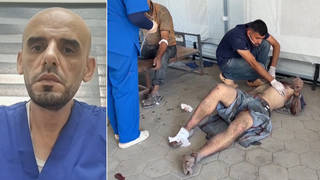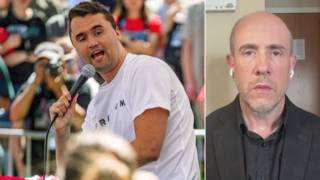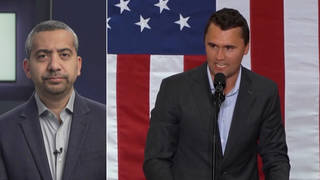
Texas and Virginia plan to kick-off the new year by executing five adults for crimes they committed as juveniles. All of the individuals had an untreated mental illness at the time of their arrest and were not referred to the juvenile justice system for rehabilitation and treatment, but instead were tried, convicted and sentenced in adult courts. [includes rush transcript]
Several international treaties to which the United States is a signatory, including the International Covenant on Civil and Political Rights, the Convention on the Rights of the Child, and the American Convention on Human Rights, oppose use of the death penalty for people who were children at the time of the crime. Only five other nations are known to have executed juveniles in the last decade: Iran, Nigeria, Pakistan, Saudi Arabia, and Yemen. The federal government and many states prohibit the execution of people for offenses committed before the age of 18.
Four of the executions are scheduled to occur in January and one in February, marking the first time since the U.S. death penalty was reinstated that so many juvenile offenders would be executed in so short a period of time. Each was convicted of murder.
In letters to Texas Governor George W. Bush and Virginia Governor James S. Gilmore, III, the National Mental Health Association asked them to commute the death sentences and end the practice of executing individuals for crimes committed while juveniles. In addition, the NMHA Board of Directors passed a resolution opposing the executions and urged NMHA’s 340 affiliates to oppose them as well.
Guest:
- Michael Faenza, CEO and President, National Mental Health Association.
Transcript
AMY GOODMAN: Douglas Christopher Thomas, Steve Roach, Glenn McGinnis, Anzel Jones and Toronto Patterson — five men, who when they were each seventeen years old committed a very serious crime: they murdered someone. In the next two months, they all are set to be executed. It will mark the first time since the death penalty was reinstated in the United States that so many juvenile offenders would be executed in so short a period of time.
Well, just last month the National Mental Health Association voted to oppose the executions of these five people who committed their offenses under the age of eighteen. And we’re joined right now by Michael Faenza, who is CEO and President of the National Mental Health Association. Welcome to Democracy Now!
MICHAEL FAENZA: Good morning.
AMY GOODMAN: Can you tell us about this move by the NMHA to try to stop these executions, and what chance do you think you have? The executions will be performed in Texas and Virginia, the first, Douglas Christopher Thomas, on January 10.
MICHAEL FAENZA: Yes, well, the fact that we in this country at this time in our history are going to start the millennium by putting five people to death that committed crimes when they were kids is — it’s just an unbelievable thing to our organization, and, in fact, there has been an outcry, virtually a consensus, against the execution of people who were children at the time of their crime at an international level.
In terms of will we have an impact, will the sentences of these young people be commuted, I do not know. We’re up against a huge public relations battle, sadly, because of the politicization of punishing children in this country. There’s only been five nations that have executed juveniles in the last decade and — five other nations. And those are Iran and Nigeria, Pakistan, Saudi Arabia and Yemen. The use of the death penalty, it’s important to note, against juvenile offenders is actually directly prohibited by several international treaties to which the United States signed on. And those include the International Covenant on Civil and Political Rights, the Convention on the Rights of the Child, and the American Convention on Human Rights.
I was actually thinking, as I was listening to your terrific program about the advances in technology and the huge implications of technology, its impact on privacy and just the life of Americans and people all over the world, that even though we are there with technology, some of the most basic issues facing human beings, to us, seem to be stuck in an era of barbaric social action. I think the fact that this country would go against these international treaties, that we have federal and state policy that allows people who were minors to be executed, really is a caricature of how little progress we have made, where I think arguably it counts the most.
And when we look at what is happening in terms of punishment of young people and how our justice system is operating, you know, we need to realize that the context for these kind of actions is that there are almost two million people locked up in this country. The tie to mental health and mental illness for our organization is that at a number of levels kids and adults with mental illnesses are increasingly lacking availability to treatment and being caught in justice systems. And as terrible as the crimes were of these five young men, who were actually considered children at the time of their offenses, all of them had a history of abuse and very serious mental health problems that weren’t treated adequately, and these situations should be taken into account when there is a sentencing for such a terrible crime. And it’s just unconscionable that these five young people are being put to death in this day and age in the United States.
AMY GOODMAN: Michael Faenza, President of the National Mental Health Association. Now, your group has sent letters to Texas Governor George W. Bush and to the Virginia Governor James Gilmore. Have you gotten a response?
MICHAEL FAENZA: At this hour, we still have not.
AMY GOODMAN: The first execution is scheduled for January 10: Douglas Christopher Thomas. He is one of two white men. He’s twenty-six; the others are twenty-three, twenty-six, twenty-one and twenty-one. The other three are African American in Texas; the two in Virginia are white. I think that really also shows pretty much the breakdown on death row, the disproportionate number of people of color on death row. But January 10th is coming up in Virginia. What are your plans?
MICHAEL FAENZA: Well, what we are doing is working with our 350 affiliates across the country. There are mental health associations in counties and state capitals across this country, and our folks have been urged also to write Governors Gilmore and Bush, and also we’re making our position known to media in those states, so there’s folks that are writing letters and making phone calls to the Houston Chronicle and the Dallas Morning News and the media in Virginia also.
AMY GOODMAN: You mentioned that there are international treaties against this that the United States is a signatory to, like the International Covenant on Civil and Political Rights, the Convention on the Rights of the Child, the American Convention on Human Rights, but do these conventions really have any effect on U.S. government practices?
MICHAEL FAENZA: Well, they certainly do in areas where the federal government and the political climate support the substance of the agreement. What we have done in the United States over the last few years — and it really started with the reinstatement of the death penalty in 1976 — was to create federal legislation and state legislation that has made it increasingly probable for young people to be put to death, for young people who have committed crimes, including crimes that do not involve taking the lives of other people, to be treated as adults in the criminal justice system. So if this had not — if we had not had this kind of political and legislative movement in the United States, I’m sure there would be an outcry if other countries, Western countries, were implementing this practice, but we seem to be turning our head in Washington and in the state capitals.
AMY GOODMAN: Do you have any political strategy planned for this year? It is the presidential election year. All of the major candidates, the Democratic and Republican parties, support the death penalty. What are you going to do about that? We have ten seconds.
MICHAEL FAENZA: Well, we are not going to take on the death penalty, but we are certainly going to take on the criminalization of mental illness in kids and adults and call for reform. And what we’re seeing with the death of these five kids pending is just a caricature of the wrong direction we’re moving in.
AMY GOODMAN: If people want to get ahold of information from the National Mental Health Association, where can they call or go on the web?
MICHAEL FAENZA: They can — let’s see, I’ll give you that right now — they can call the National Mental Health Association at 703-838-7500.
AMY GOODMAN: And I see your website is www.nmha.org, National Mental Health Association. Well, I want to thank you very much, Michael Faenza, for being with us.











Media Options